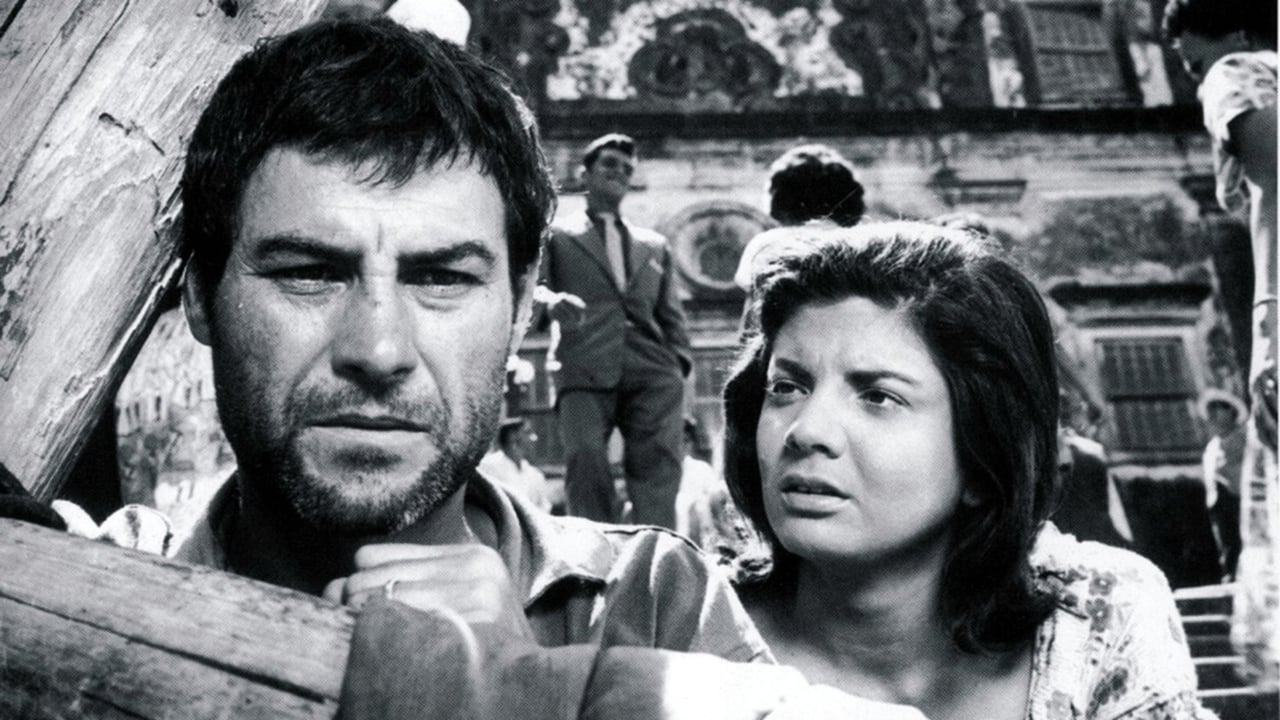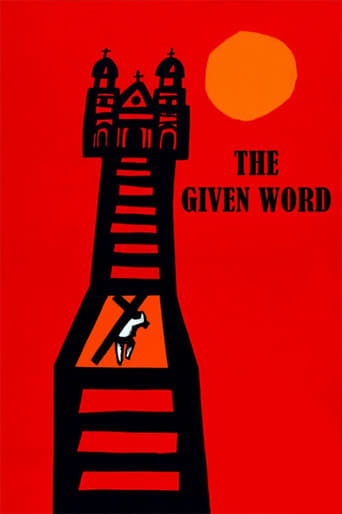Bento de Espinosa
A shame such an important movie has no poster here on IMDb. I wanted to add the one that is used on Wikipedia, but I would have to pay to do that. Strange.Anyway, if you are critical of religion fanaticism, then you must see this movie! It shows what can become of fanatic people, how lack of education plays an important role in it, the arrogance of the church and the hypocrisy of our society.Zé do Burro (Joe of the Donkey) has a soul of a child. He is a good guy, but extremely naive at the same time. His naivety is shamelessly exploited and people cruelly distort his good intentions, making an evil person out of him, when all he wanted was to do good.The movie won the Golden Palm in Cannes and other prizes. It's a classic. Dialogs are a bit theatrical (only if you understand Portuguese), but so they used to be that time. A movie that will get under your skin.
gustavo_ma92
Usually, the books are better than the movies that are made based on them. But, on this case, of O Pagador de Promessas, I really can't say which one is better. I'm starting to think the movie is better than the book, because the director, Anselmo Duarte, has added many things that weren't on the book, and they only contribute to improve the story. For example, the TV reporter and the people who go ask Zé do Burro for miracles. That part reminded me of that scene in Forrest Gump in which Forrest runs for three years and people start following him, thinking he was some kind of wise prophet, when he simply wanted to run. Actually, the whole story of O Pagador de Promessas is kind of that. A guy who only wants to pay his promise to a saint and is made a prophet, a "new Christ", a devil worshiper, and ends up dying because of some people's prejudice towards aspects that integrate their own culture.
debblyst
Poor, simple peasant farmer Zé do Burro (Leonardo Villar, in a rock-solid performance) and his wife Rosa (Glória Menezes, appropriately unglamorous) leave their small cropland in the back country of Bahia. Zé is lugging a huge wooden cross on his shoulders under rain and shine to place it in the altar of St. Barbara's church in Salvador, 42 km away, as an offering for the miraculous healing of his ailing donkey. But the local priest (Dionísio Azevedo, blunt and one-dimensional) won't let Zé in when he learns the promise of the offering was made to an image of Iansã, a Candomblé goddess who is "analogous" to the Catholics' St. Barbara in Brazilian religious syncretism. Zé won't give up his promise and the conflict is set, with public commotion, opportunists on the spot and tragedy in the air."O Pagador de Promessas" was based on a hit play of the same title, written by famous leftist author Dias Gomes (who didn't want big-movie-star-but-little-experienced-director Anselmo Duarte to direct the screen version). Duarte ultimately got the rights, and he made a faithful adaptation — so faithful in fact that the film looks and sounds stagy, though the restless mob of onlookers to the events on the church's imposing stairway gives the film a welcome "open air" feel.The story is the fight for the beliefs of an individual -- Zé, who's the only "good guy" in the movie -- against fierce opposition from "bad guys": Catholic priests (who are arch villains here), the media (the press and TV), the police, political interests (there is an offer for Zé to support a congressman in an upcoming election) and the opportunists who seek to take advantage of the situation: the pimp Bonitão, the journalist played by Othon Bastos, the popular poet Dedé, the bar owner, and even Zé's own wife Rosa, who's later torn with remorse. Zé's firmness — or stubbornness — is nowadays naively monolithic, but bold themes were addressed here: Catholicism vs Candomblé, Catholic Church power vs Catholic principles, private property vs land-sharing... (Contrary to one IMDb reviewer, though, the film was NOT chopped by censorship because of religious issues — it wasn't censored at all).The contrived subplot — Rosa's fling with pimp Bonitão (Geraldo del Rey, stiff but handsome) and her dispute with prostitute Marly (sexy Norma Bengell in a star-making role, with a great sneering scene near the end) -- is digressing rather than enriching. There is some nice camera-work by British D.P. Chick Fowle, but it's more stylish than organic. The best moments are the Candomblé ceremony at the very beginning and the dazzling Capoeira fights: the music is so hypnotic and the movements so serpentinely athletic that the film momentarily becomes electrifying."Pagador..." was Oscar-nominated for Best Foreign Film (it lost to Serge Bourguignon's cult "Dimanches de Ville d'Avray") and — to everyone's wild astonishment -- won the Golden Palm at Cannes in 1962 against formidable competition: Buñuel's "Exterminating Angel", Antonioni's "L'Eclisse", Germi's "Divorzio all'Italiana", Clayton's "The Innocents", Bresson's "Procès de Jeanne d'Arc", Cacoyannis' "Elektra", Tony Richardson's "Taste of Honey", Lumet's "Long Day's Journey...", Varda's "Cléo de 5 à 7", Satyajit Ray's "Devi"...WOW!! And remember François Truffaut himself was in the jury!. My bet is that, THROUGH "Pagador...", Cannes recognized some important issues at the time: a) the "free portion" of Latin America, as Brazil was then one of the few Latin American countries that had overcome a dictatorship (by Getúlio Vargas), and established a "stable" democracy with free elections; b) Brazil was then run by center- leftist President João Goulart (who would be deposed by a military coup 2 years later) who was making serious talk about Agrarian Reform, one of the film's themes and one of Latin America's central issues; c) the anticlerical, rebellious, independent, truth-searching sentiment attributed to "the ordinary man," the "peasant"; d) Brazil itself, who was definitely fashionable then, because of the Bossa Nova explosion, the international deification of soccer hero Pelé, the construction of Brazil's new capital Brasília regarded as a new architectural wonder, the huge success of 1959 Golden Palm and Oscar- winner French film "Black Orpheus" shot in Brazil in Portuguese and featuring Rio's Carnival, etc)."Pagador..." has undeniable assets, but it was already conservative and predictable in 1962. Contrary to what another reviewer here at IMDb wrote, it was NOT part of the Cinema Novo (Brazilian New Wave) movement; in fact Anselmo Duarte was always rejected by the Cinema Novo filmmakers (especially by Glauber Rocha) because he had come from the very studio system ideology (Vera Cruz and Atlântida) against which they were fighting. And though "Pagador..." followed three of the main dogmas of Italian Neo-Realism that were also adopted by Cinema Novo — shooting on location/use of non-professional actors (though only in bit roles here)/"ordinary people with ordinary problems" as theme — we're aware the whole time we're watching carefully staged scenes where improvisation, boldness and experimentalism remain alien.Anselmo Duarte will forever be inscribed in Brazilian film history as THE filmmaker who brought to Brazil its only Cannes Golden Palm. But 45 years later, it's only fair to admit that time hasn't been so kind to it. If you don't raise your expectations too much, if you forget that this one won a Golden Palm over several international (some of them immortal) masterpieces, you'll watch a decent story, never boring, honestly told. NOTE: "Pagador..." remains to this day the ONLY Latin-American film EVER to win the Cannes top prize since 1947, which says a lot about Cannes' ethnocentrism. Some eloquent numbers: as of 2006, Cannes' top prize films have come from Europe 43 times, against 15 from the US; 6 from Asia; and 1 each from Latin America, Africa and Oceania. Although the artistic supremacy of European cinema in the 20th century is undisputed, the proportion is highly debatable.
Flavio Velame
It is not a surprise that this movie won the golden palm in Cannes. The story of the man that carry a big and heavy cross as a promise for the healing of his donkey is the simpliest and the most beautiful. The poetic way as it is shown became the film an unforgettable classic, with Zé as the protagonist. For sure, technically it is a pre-historic film, the sound quality and editing is really bad, but it even help the audience to focus what really cares. That is not only about poverty, but about humanity. If you liked Central Station, you can't miss.

